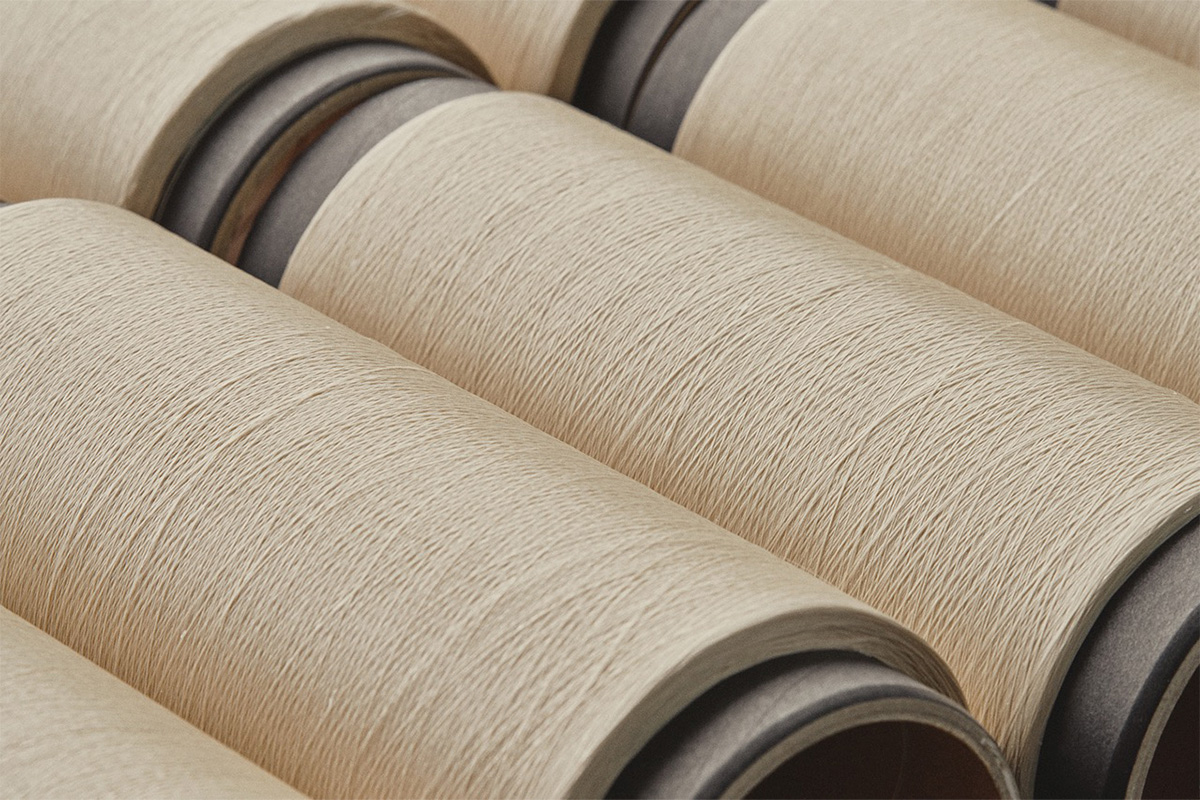Spiber Inc. is a Japanese biotechnology company developing synthetic protein material via a microbial fermentation process, that uses sugars
Designing material from the molecular level
Non-renewables are progressively being discarded by industries as their main sources of raw materials to replace them with biobased synthetics.
Spiber Inc., a Japanese biotechnology start-up, uses synthetic biology to develop protein materials – ‘Brewed Protein’. With the intention of wanting to know more about these polymers, Lampoon spoke to Ayana Nakajima, PR&Marketing specialist at Spiber Inc. «We design DNA».
Spiber Inc. uses genetic modification, a technology once used for selective breeding that has now evolved into the fields of genetic engineering and synthetic biology, where much more precise tools are used to select individual genes to design or ‘engineer’ organisms from the genetic level.
Studying species of spider silks
«We have a big database of protein DNAs extracted from nature. Our material hunting team used to go into the jungle in Japan to find creatures whose DNA can be analyzed. After collecting, we analyze what kind of characteristics each DNA has . We used to replicate DNAs from the proteins found in nature such as spider silk, but now, while still referring to that database, we create our own by cycling feedback of experiments».
The data collected from studying species of spider silks and other creatures has enabled the team to develop its own proteins in laboratory, produced through a fermentation process that utilizes plant-based materials and process them into a variety of forms, such as filament fibers, spun yarns, resin, faux fur, films, and more.
The process: microbial fermentation
Once basic genetic information is collected and analyzed, next step is to find the amino acid sequences and design DNA that provides desired characteristics of protein and synthesize. They synthesized genes are inserted into microbes which will produce polymers in their body. «We feed sugar to microbes and they fermentate and produce polymers »explainedNakajima.
«Then it goes through a process called purification in which only the polymers are extracted. The final output is in powder form. From here we go through a spinning process where we dissolve this powder into a solvent, extrude it through nozzles like a shower head with holes and it becomes a yarn. Changing the fiber diameter and protein content percentage allows for the creation of a variety of textures».
Spiber Inc. strictly complies with the Cartagena Protocol on Biosafety
The microbes used in the fermentation process are designed specifically to produce the polymers. But what happens to the microbes after that step? These GMO beings, before further processing into the form of fibers or fabrics, are completely removed from the Brewed Protein polymers in order to prevent any impact on biological diversity.
As specified by Najakima, Spiber Inc. strictly complies with the Cartagena Protocol on Biosafety – an international agreement aiming to ensure the safe utilization of GMOs – and other local regulations at each and every stage of their research and production processes.
«The microbes we use are as safe as possible for humans and the environment. While the exact type of microbes that we use is proprietary, we can share that they are non-hazardous to human health. In each country that we operate, the microbes we use are classified within the biological safety level1 for organisms that pose the lowest possible levels of risk to humans and the environment. The microbes have also been designed to survive only in our closed fermentation system, and do not remain active upon exiting. This ensures that if there were an accidental leak, the microbes would not pose a risk to humans or the environment».
Biodegradability in soil and seawater
Internal tests conducted by Spiber Inc. showed the material biodegrades in both soil and seawater. Unprocessed Brewed Protein fibers in marine environment to assess biodegradability together with cotton and polyester fibers. After 30 days, Brewed Protein fibers biodegraded, whereas conventional polyester fibers (the most common textile fibers) have almost no biodegradability in the natural environment.
Although it may seem like quite a good result, it is always important to keep in mind that the materials biodegradability is different from end-product’s biodegradability. It requires a comprehensive design to make an end-product biodegradable or recyclable. Usually, the resistance to decay that occurs after three months of contact with soil or water indicates the main component in the observed subject is plastic-derived.
Even though they might take longer to decompose, polymers made from biomaterial are much quicker to biodegrade than any other synthetic counterparts that would normally take several hundred years. «Results may vary depending on the processing it went through, the finishing and the dye that has been used. And the state of the surrounding environment» clarified Nakajima.
Production using plant-based feedstock
The primary ingredients used by Spiber Inc. are agricultural products such as sugars derived from sugarcane or corn. The company is a member of Bonsucro – a global multi-stakeholder industry platform that promotes sustainable sugarcane production – and they source its certified sugarcane for the Thai plant polymer production, which offers higher traceability and lower negative environmental and social impact than the industry average.
Spiber Inc.’s production site in the US will be making polymers primarily from corn produced by the cover crop farming method, an approach that improves the water quality of the surrounding area preventing the outflow of fertilizer, reduces greenhouse gas emissions through carbon storage and saves more energy in comparison to conventional industrial farming methods.
Implementing further sustainable practices
Spiber Inc. has plans to recover the solvent used from the spinning process from the Pilot plant in Tsuruoka, Japan. «A solvent recovery process is targeted to be implemented in 2023. Until then, solvents will be treated at a specialized treatment facility where they will be biologically digested».
Unlike petrochemical polymer materials such as PET or nylon, Brewed Protein materials do not rely on fossil resources as primary feedstock. However, Spiberʼs current supply chain does utilize energy that is generated by the burning of fossil fuels.
«We are targeting entry into a Virtual Power Purchase Agreement (VPPA) that can meet the demand for renewable energy in all domestic and overseas production and businesses». A Virtual Power Purchase Agreement (VPPA) is a swap contract in which a corporate buyer ensures that a renewable energy project developer will receive a long-term (typically about 10–20 years) fixed cash flow in exchange for certificates of the environmental attributes such as Renewable Energy Certificates (RECs) of the electricity generated by that new project.
Other goals include the introduction of renewable power generation aiming for 100% renewable electricity use, contributions towards the procurement of optimal renewable energy and the construction of power systems with low environmental impact.
Spiber Inc.
A biomaterials company founded in 2007 and based in Japan. They are known for inventing Brewed Protein materials made from polymers derived from plant-based ingredients and made through microbial fermentation




















